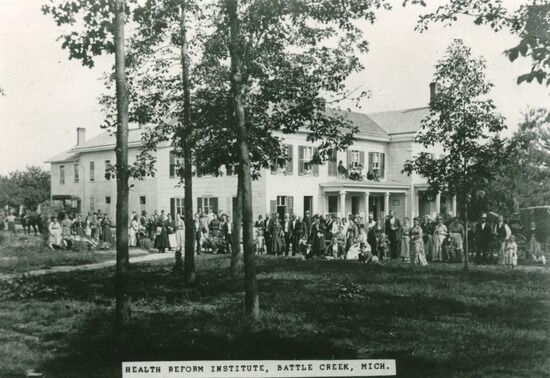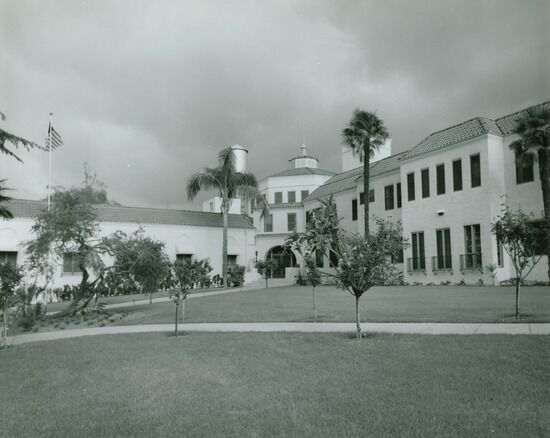Adventists talk a lot about health principles and disease prevention. But how do we handle sickness and medical needs when they inevitably come along?
The Seventh-day Adventist Church believes in and supports evidence-based medical care. In fact, medicine has played a significant part in our history, and today we run a major health system with hospitals, medical schools, and clinics throughout the world.
Whole-person care is integral to our mission as a denomination.
For more on this, we’re going to look at:
Why Adventists believe in medical care
Adventists value a whole-person approach to health because we want to follow Jesus’ model of caring for physical, mental, and spiritual needs. From our beginnings, we’ve supported “scientific approaches to health care over pseudoscientific ones.”1 Our hospitals, medical schools, and clinics are a case in point.
A healthy lifestyle is the first line of defense in preserving health, but we also recognize the need for proper medical treatment. All members are free to seek out and choose the care that is best for their situation.
And this philosophy originates with Jesus.
Jesus cared for people’s physical, mental, and spiritual needs while on this earth. Healing was a significant part of that work. Matthew 4:23 tells us that:
“Jesus went about all Galilee, teaching in their synagogues, preaching the gospel of the kingdom, and healing all kinds of sickness and all kinds of disease among the people” (NKJV).
Meeting physical needs opened people’s hearts to receive the truths Jesus had for them.
Likewise, church members show the healing ministry of Jesus by meeting people’s physical needs. This is why we have 190 hospitals worldwide, plus clinics and medical schools such as Loma Linda University.
With that said, you may be wondering why, then, some might be confused about our stance on medical care.
Why would someone think Adventists don’t believe in medical care?
Despite the Adventist Church’s strong support of medical care, some people have concluded that we don’t believe in it. There are two reasons for this:
- Misunderstanding our focus on lifestyle and natural remedies
- Confusing us with other religions that don’t believe in medical care
Misunderstanding our focus on lifestyle and natural remedies

Photo by Lisa Hobbs on Unsplash
Adventists talk a lot about our eight principles of health and well-being: nutrition, exercise, water, sunlight, temperance, air, rest, and trust in God. Indeed, God has provided many things in nature that are healing and beneficial.
Some, for instance, may opt to try certain herbal remedies or hydrotherapy (treatment with water) before going ahead with conventional treatment.
One common reason for doing so is to avoid the negative side effects of certain medications while also supporting the body’s natural processes of healing.
Others have had success with reversing chronic conditions, such as diabetes or hypertension, through a plant-based diet, exercise, and other lifestyle changes (while under the supervision of a doctor). In these situations, natural methods often work well alongside modern medicine.
Thus, this emphasis on natural methods doesn’t mean we discard conventional medical care or reject medical advice. Some individuals may do so, but the official stance of the Adventist Church has always supported people in getting proper medical care for their situations.
Confusing us with other denominations or religions that don’t believe in medical care
Some religions, and even Christian denominations, have rules about medical care that people have misapplied to Adventists.
For example:
Jehovah’s Witnesses don’t believe in taking blood transfusions.2 They see it as “a religious issue rather than a medical one.”
The Amish3 tend to rely on home remedies, even though their religion doesn’t forbid seeking medical care.
Christian Scientists believe in praying for healing and encourage their members to go to Christian Science practitioners rather than seeking traditional medical care.4
But as we’ve explored up to this point, none of these viewpoints reflect Seventh-day Adventist beliefs. We don’t discourage our members from seeking medical treatment.
But let’s look at a few cases in which Adventists might reject medical care, or certain types of treatments.
When would Adventists reject medical care?

Photo by Monstera Production
Adventists strongly believe that modern medicine has its place. We support medical care and the freedom to make choices in this area. But with the Bible as our foundation, many Adventists have moral and ethical convictions to avoid accepting treatment that would take life.
These kinds of things would include:
- Abortion
- Euthanasia, “mercy killings,” or assisted suicide
Our main reason for this is that we see life as a gift from God that begins at conception (Psalm 139:16; Jeremiah 1:5). He asks us to value that life (Exodus 20:13), so we don’t believe it is our prerogative to end it for medical reasons.
(Note: This does not necessarily apply in cases of patients with “Do Not Resuscitate” orders.)
In 2019, the General Conference of Seventh-day Adventists said the following in its official statement on abortion:
“The Seventh-day Adventist Church considers abortion out of harmony with God’s plan for human life. It affects the unborn, the mother, the father, immediate and extended family members, the church family, and society with long-term consequences for all. Believers aim to trust God and follow His will for them, knowing He has their best interests in mind.”
You can also find the following official statement about euthanasia:
“While Christian love may lead to the withholding or withdrawing of medical interventions that only increase suffering or prolong dying, Seventh-day Adventists do not practice ‘mercy killing’ or assist in suicide (Genesis 9:5, 6; Exodus 20:13; 23:7). They are opposed to active euthanasia, the intentional taking of the life of a suffering or dying person.”
These statements are not meant to point fingers, however. We don’t condemn those who have chosen to use one of these methods. We recognize these are difficult topics and approach all people with sensitivity and grace.
When it comes to other medical topics, such as vaccinations or birth control, Adventists have many different viewpoints.
Some individuals have strong reasons for not taking certain vaccinations or using birth control. Others have equally strong reasons for doing so. That’s why the Adventist Church supports the freedom to make decisions according to conscience.
Let’s take a moment now to understand how healthcare has developed throughout the history of Adventism, bringing us to where we’re at now.
Healthcare in the history of the Adventist Church
Since 1865, healthcare has been an important part of the Adventist mission. Ellen White, one of our founders, encouraged this movement and the development of health institutions.
Here’s how it started.
Our first health institution
Back in the mid-1800s, medical treatment was at a turning point. Many had bought into snake oil potions from “doctors” who, in reality, had very little training. Bloodletting, the use of mercury and arsenic (among other things) as medicine, and improper hygiene—all of these and more had made people skeptical of the medical profession.5
As a result, new and varied approaches were popping up. Some people began to explore the influence of lifestyle on health and disease.
During this time, the Holy Spirit impressed Ellen White with the importance of basic health principles, like proper nutrition (such as a vegetarian diet), exercise, sleep, etc. And in 1865, she advocated for the Church to start its own health institutions where it could teach these principles.

Courtesy of the Ellen G. White Estate, Inc.
Notice what she wrote:
“The Lord years ago gave me special light in regard to the establishment of a health institution where the sick could be treated on altogether different lines from those followed in any other institution in the world. It was to be founded and conducted upon Bible principles…and it was to be in His hands one of the most effective agencies for giving light to the world. It was God’s purpose that it should stand forth with scientific ability, with moral and spiritual power, and as a faithful sentinel of reform in all its bearings.”6
God wanted Adventist medical centers to not only reflect biblical principles but also “stand forth with scientific ability.”
When the first one—the Western Health Reform Institute (later the Battle Creek Sanitarium)—began in 1866, its care was far ahead of its time. It hired medical professionals—both doctors and nurses—to give natural treatments and teach principles that are now verified by science.
Later on, it became known as the Medical and Surgical Sanitarium and continued to use scientifically-based treatments.7
At its peak, many well-known individuals were treated there. Individuals like John D. Rockefeller, Henry Ford, Thomas Edison, William Howard Taft, Warren Harding, Calvin Coolidge, and the Roosevelts.8
The work at Battle Creek paved the way for other medical institutions in the Church.
Keeping up with medical advances
Ellen White herself was open to the scientific advances of her time, such as the smallpox vaccine, x-ray therapy, and blood transfusion.9 By the turn of the century, surgical procedures had greatly improved, and she supported their use. Here’s what she said about surgery:
“If there is need of a surgical operation, and the physician is willing to undertake the case, it is not a denial of faith to have the operation performed.”10
Through her own actions, this leader in Adventism encouraged church members to be pioneers in healthcare, eventually leading to the innovative medical establishments we have today.
A medical school and more hospitals

Courtesy of the Ellen G. White Estate, Inc.
In 1905, Adventists incorporated Loma Linda Sanitarium and opened its nursing school. It grew and expanded, so they built an 11-story building in 1967—which is still used today. In 1993, it added the Loma Linda University Children’s Hospital, providing a total of 900 beds for patients.
Today, Loma Linda University and Medical Center are on the cutting edge of technology and medical care. The university receives students from 80 countries and every state in the United States into its various programs—dentistry, medicine, nursing, pharmacy, public health, etc.
Other well-known medical institutions are Adventist HealthCare (Maryland), the Adventist Health network (west coast and Hawaii), AdventHealth (Florida), and Kettering Health (Ohio).
Adventists also continue to raise the standard of care in other countries. Loma Linda University Health has helped establish hospitals in places like Africa, Asia, and South America. And Adventist Mission has sent doctors and nurses to work in clinics and hospitals worldwide.
Adventists promote freedom of choice in medical care
Medical care and technology are invaluable in saving and preserving life. And as long as they’re used in this way, the Adventist Church stands behind their use. We support medical advancement and participate in it through our many medical institutions and professionals worldwide.
It’s one of the ways we show the love and care of Christ.
And for personal medical needs, Adventists have free choice in whether to seek care, and what kind to get—just like anyone else. God offers us freedom of choice, and we believe in offering the same to others.
Choose an Online Bible Study
Want to keep learning? Find out more about Jesus, humanity, the plan of salvation, and how God loves you enough to sacrifice everything, just to give you a chance to choose Him.
Sometimes it can be hard to know where to start, that’s why we offer free, user-friendly, online Bible study options you can do anytime, anywhere, and at your own pace.
This online Bible school will take you through the major themes of Scripture, breaking down the Bible’s complex concepts into bite-sized pieces, which can lead you toward the answers of life’s more challenging questions.
- DuBose, Edwin R., ed., “The Seventh-day Adventist Tradition: Religious Beliefs and Healthcare Decisions,” Park Ridge Center for the Study of Health, Faith, and Ethics, 2002, p. 2. [↵]
- https://www.jw.org/en/jehovahs-witnesses/faq/jehovahs-witnesses-why-no-blood-transfusions/ [↵]
- https://groups.etown.edu/amishstudies/cultural-practices/health/ [↵]
- https://www.christianscience.com/press-room/questions-and-answers [↵]
- Robinson, Doris, The Story of Our Health Message (Southern Publishing Association, Nashville, TN, 1965), pp. 17–22. [↵]
- White, Ellen, Counsels on Health (Pacific Press, Mountain View, CA, 1923) p. 204. [↵]
- Gomide, Jonathan, “Battle Creek Sanitarium (1866–1942),” Encyclopedia of Seventh-day Adventists, Feb. 27, 2022. [↵]
- Ibid. [↵]
- Hirst, Albert, “Ellen White’s Attitude Toward Medical Progress,” Adventist Review, July 14, 1983.[↵]
- White, Ellen. Manuscript 67, 1899. [↵]
Related Articles
More Answers
Do Seventh-Day Adventists Have “Rules” For Clothing?
Many religions have guidelines on dress, but what about the Adventist Church? Discover how Adventists choose to dress based on biblical principles.
11 Reasons People Become Seventh-day Adventists
Curious why many people become Adventists? Here are elements of Adventist beliefs, values, and mission often reflected in people’s decisions to join.
What’s the Seventh-day Adventist General Conference Session?
At the General Conference Session, Adventist delegates from around the world gather to assess the state of the organization, pray, and discuss current issues. Here’s how it works.
How Adventists View the End of the World
The end of the world is no fun to think about. But here’s how we can actually find hope and comfort in what’s to come.
What Is an Adventist Medical Missionary?
A medical missionary in the Adventist Church is someone who cares for the medical needs of people as a way of showing the love of Jesus. They may travel to another country, or even just serve in their hometown.
Is the Seventh-day Adventist Church Protestant?
Learn how the beliefs of the Seventh-day Adventist Church align with the “5 solas” of Protestantism.
Are Seventh-day Adventists Evangelicals?
According to its origins and definition, evangelicalism is about following Jesus and the Bible and sharing the Gospel through the way we live our lives. Adventists wholeheartedly harmonize with these principles.
Could Anything Keep Me from Becoming an Adventist?
We are each saved through Christ. But when it comes to church membership, are there certain beliefs or expectations to become an Adventist?
Do Seventh-day Adventists Have “Rules”?
We uphold principles we believe will help us maintain a closer relationship with Jesus and His Word. Learn how these principles guide Adventist lifestyles.
Do Seventh-day Adventists Have “Rules” For Marriage?
Around the world, many cultures and religions have various marriage traditions, expectations, or even rules when it comes to choosing a partner, planning the wedding, extended family logistics, or a number of other things.
Can a Seventh-day Adventist Marry a Non-Adventist?
Yes. Seventh-day Adventists are not under any official rules that dictate who they can or cannot marry. This is a personal, life-altering decision between the couple and God.
What Adventists Believe About Alcohol and Tobacco Use
The Seventh-day Adventist Church has historically discouraged the use of alcohol and tobacco. Even before the church started in 1863, its leaders were realizing the negative effects of these substances.
Jewelry—Why Do Many Seventh-day Adventists Choose Not to Wear It?
If you walk into a Seventh-day Adventist church service, you might notice that many people aren’t wearing earrings, bracelets, necklaces, or sometimes even wedding rings.
International Pathfinder Camporee
Youth aged 10-15 in the Adventist Church’s global Pathfinder program look forward to the International Camporee every 5 years. This event brings together Pathfinders from around the world for exciting activities.
How Adventists interpret Bible prophecy
Bible prophecy conjures up a variety of emotions in people. For some, it feels exciting or mysterious.
Moviegoers’ Guide to The Hopeful: The Facts Behind the Film
Learn where and when you can watch The Hopeful and how to get tickets. Already seen it? We’ll uncover the real story that inspired this film.
How Are Seventh-day Adventists Different from Other Protestants?
As a Protestant Christian denomination, the Seventh-day Adventist Church regards the Bible as the ultimate guide and looks to Jesus Christ as the only way to salvation. We do have some differences of belief or interpretation when it comes to topics like Bible prophecy, end-time events, the Sabbath, and a person’s state after death.
How Adventists Handle Death and Funerals
Most Seventh-day Adventist funeral services are similar to those of other Protestant denominations, such as Methodists, Baptists, or Presbyterians, but you might find a few differences or unique nuances.
Adventist Culture
Many Seventh-day Adventists adhere to specific lifestyle principles that can make them stand out from those in other Christian denominations. Whether it’s going to church services on Saturday or eating the popular Adventist entrée of “haystacks.”
Do Adventists Observe Easter-Related Holidays?
Jesus Christ’s resurrection, celebrated on many Easter-related holidays, is central to the beliefs of the Seventh-day Adventist Church. And that means we seek every opportunity to remember it.
An Overview of Seventh-day Adventist Higher Education
The Seventh-day Adventist Church has about 118 tertiary schools around the world. Though many of them are within North America, you’ll also find Adventist universities in countries across the world—places like Croatia, Austria, Brazil, Madagascar, and the Philippines.
The Ten Commandments from a Seventh-day Adventist Perspective
Ever eaten a salad and gotten a big piece of green stuck in your teeth? And you didn’t realize it was there until you looked in the mirror? (Because no one ever told you!)
The Benefits of A Seventh-day Adventist Academy
Adventist academies are high schools (grades 9-12) that are owned and operated by the Seventh-day Adventist Church.
Are Seventh-day Adventists Christians?
Yes, the Seventh-day Adventist Church is a Protestant Christian denomination formed in 1863. Just like other Christians, we believe that Jesus Christ is our Savior and seek to follow the principles of the Word of God.
Adventist Movies: Where Faith and Film Meet
The Adventist Church uses film to share our faith and uplift positive values. Learn more about specific Adventist-produced films and where to find them.
Do Adventists Celebrate Christmas?
In general, most Seventh-day Adventists do celebrate Christmas.
Since our denomination doesn’t have specific guidelines about holidays, it’s up to each member to decide whether to celebrate it based on their personal convictions and study of the Bible.
What Does the Bible Say About Modesty
Seventh-day Adventists and Christians in general try to ensure their outward presentation and lifestyle glorify God. This often involves daily habits like the ways we hold conversations, the ways we dress and accessorize, and the ways we regard other people when we’re out and about.
How Do Adventists Make Movie and Music Choices?
How do Adventists decide what music to listen to and which movies to watch? Learn how Bible principles can help us make better entertainment choices.
Does the Seventh-day Adventist Church Believe in Paying Tithe?
Seventh-day Adventists believe in paying tithe and offerings based on the biblical command and our commitment to being wise stewards of God’s resources. These donations help fund the mission of the Adventist Church by supporting pastors, missionaries, church expenses, and evangelistic projects, among other things.
Didn’t find your answer? Ask us!
We understand your concern of having questions but not knowing who to ask—we’ve felt it ourselves. When you’re ready to learn more about Adventists, send us a question! We know a thing or two about Adventists.































